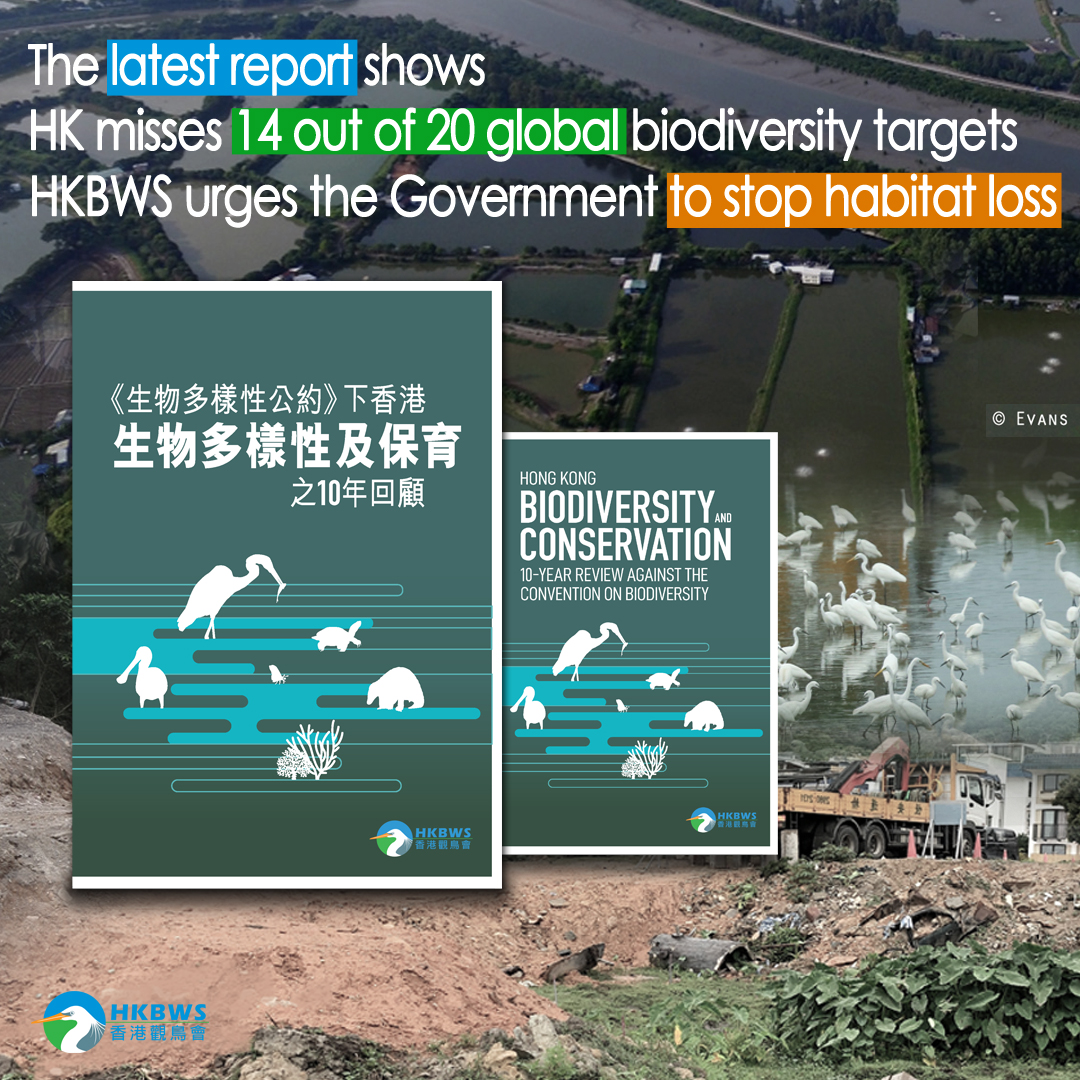Hong Kong misses 14 out of 20 global biodiversity targets
10-year review calls for whole-of-government approach and complete conservation policy
(2021, October 4)
The Hong Kong Bird Watching Society (HKBWS) today released the “Hong Kong Biodiversity and Conservation 10-year Review against the Convention on Biological Diversity” (10-year Review), on the eve of the 15th Conference of Parties to the Convention on Biological Diversity (CBD). The review shows that Hong Kong has partially achieved six out of 20 Aichi Biodiversity Targets (ABTs). HKBWS urges the HKSAR Government to take serious measures to assist China in meeting its obligation under the CBD.
The conclusions in the 10-year Review, which was funded by ADM Capital Foundation, derive from a ten-year monitoring programme developed by Civic Exchange and conducted by HKBWS that tracked Hong Kong’s performance against the strategic objectives of the CBD. The methodology and findings are published in five HKBWS reports that provide data and insights against a set of indicators developed specifically for Hong Kong by a cross-sectoral panel of over 40 local biodiversity and conservation experts.
Protected area network is a key contributor to Hong Kong’s progress
Hong Kong’s best performance was based on its protected area network, which covers about 40% of the total land area, and provides a fine framework for protection and progressive regeneration of Hong Kong’s forest ecosystems (ABTs 5, 11, 14 and 15). The increase in the complaints of unauthorized activities in rural areas received by the Planning Department (PlanD) by two-thirds to over 1,000 per year reveals a general increase in public awareness and support for conservation (ABT 1). The formulation of Hong Kong’s first Biodiversity Strategy and Action Plan (BSAP) is a significant first step towards meeting Hong Kong’s responsibilities under the CBD (ABT 17).
Government’s land policy accelerates habitat loss
This BSAP included no specific targets or indicators, making it difficult to assess its contribution to meeting the CBD’s objectives or the ABTs. It is notable that the current BSAP did not mainstream biodiversity into policy or legislation, clearly reflecting the dis-integrated role of biodiversity within Hong Kong’s wider development agenda and threatening the survival of native species (ABTs 2 and 12). For instance, development threats were intensified around the Deep Bay wetlands of international importance, and the globally vulnerable Chinese White Dolphin population in Lantau waters has dropped by half in the past decade, likely due to several approved coastal reclamation projects.
The Government’s policy to identify land for public and private housing increases development pressure on agricultural land, Green Belts and Country Parks, undermining their conservation objectives. Long-running loopholes in existing ordinances and persistently under-resourced enforcement have increased the threats from unauthorized encroachment that lead directly to loss in native species and habitats (ABTs 5 and 12). Examples include the decline in the breeding population of Eastern Cattle Egret by two-thirds - likely due to the loss in farmland - and the continuous degradation of valuable freshwater wetlands in South Lantau caused by the inability to enforce planning control. Moreover, Hong Kong’s hands-off management in the trade in wildlife, especially of live and dried marine species for seafood, undermines the sustainability of biodiversity far beyond our boundaries (ABT 4).
Whole-of-government approach is urgently needed
Ms. Woo Ming Chuan, Deputy Director of HKBWS, said, “We must recognize and respond to the breadth of issues covered by the CBD. Conservation lies not only in the hands of the environmental authorities and environmental NGOs, but also with other bureaux, works departments, and the private sector. A whole-of-government approach and the engagement of all sectors and stakeholders are needed to address systemic gaps to properly integrate biodiversity conservation into Hong Kong’s development process as the CBD requires.”
HKBWS’s key recommendations also include the creation of a comprehensive conservation policy, which aligns with the CBD core objectives and the Post-2020 Biodiversity Framework and incorporates the best lessons from China’s implementation of the Ecological Red Line, ecological security and other environmental policies. This policy should provide the foundation for the next 5-year BSAP for 2021-2026, continuing and improving upon the Government’s good intentions in kick-starting the BSAP process.
Video 1【LESSONS LEARNED: 10-year Review on Biodiversity Conservation in Hong Kong】
Video 2【LOOKING FORWARD – Hong Kong Biodiversity and Conservation】
Special thanks to ADM Capital Foundation Limited for funding the preparation and publication of this report.
| Click here to download Full Report |




